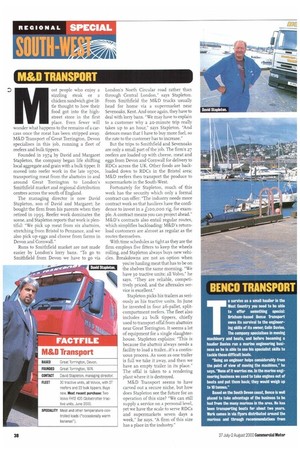M&D TRANSPORT
Page 40

If you've noticed an error in this article please click here to report it so we can fix it.
0 ost people who enjoy a sizzling steak or a chicken sandwich give little thought to how their food got into the highstreet store in the first place. Even fewer will wonder what happens to the remains of a carcass once the meat has been stripped away. M&D Transport of Great Torrington, Devon specialises in this job, running a fleet of reefers and bulk tippers.
Founded in 1974 by David and Margaret Stapleton, the company began life shifting local aggregate and grain with a bulk tipper. It moved into reefer work in the late 19705, transporting meat from the abattoirs in and around Great Torrington to London's Smithfield market and regional distribution centres across the south of England.
The managing director is now David Stapleton, son of David and Margaret; he bought the firm from his parents when they retired in 1995. Reefer work dominates the scene, and Stapleton reports that work is plentiful: "We pick up meat from six abattoirs, stretching from Bristol to Penzance, and we also pick up eggs and cheese from farms in Devon and Cornwall."
Runs to Smithfield market are not made easier by London's lorry bans. "To go to Smithfield from Devon we have to go via
London's North Circular road rather than through Central London," says Stapleton. From Smithfield the M&D trucks usually head for home via a supermarket near Sevenoaks, Kent. And once again, they have to deal with lorry bans. -We may have to explain to a customer why a zo-minute trip really takes up to an hour," says Stapleton. "And detours mean that I have to buy more fuel, so the rate to the customer has to increase."
But the trips to Smithfield and Sevenoaks are only a small part of the job. The firm's 27 reefers are loaded up with cheese, meat and eggs from Devon and Cornwall for delivery to RDCs across the UK. Other foods are backloaded down to RDCs in the Bristol area; M&D reefers then transport the produce to supermarkets in the South-West.
Fortunately for Stapleton, much of this work has the security which only a formal contract can offer; "The industry needs more contract work so that hauliers have the confidence to invest in a Ltoo,000 rig, for example. A contract means you can project ahead." M&D's contracts also entail regular routes, which simplifies backloading: M&D's returnload customers are almost as regular as the routes themselves.
With time schedules as tight as they are the firm employs five fitters to keep the wheels rolling, and Stapleton always buys new vehicles. Breakdowns are not an option when you're hauling meat that has to be on the shelves the same morning. "We have 30 tractive units; all Volvo," he says. "They are reliable, competitively priced, and the aftersales service is excellent."
Stapleton picks his trailers as seriously as his tractive units. In June he invested in four 26-pallet, split
compai tment reefers. The fleet also includes 22 bulk tippers, chiefly used to transport offal from abattoirs near Great Torrington. It seems a lot of equipment for a single slaughterhouse. Stapleton explains: "This is because the abattoir always needs a facility to load a trailer...it's a continuous process. As soon as one trailer is full we take it away, and then we have an empty trailer in its place." The offal is taken to a rendering plant where it is destroyed.
M&D Transport seems to have carved out a secure niche, but how does Stapleton see the future for an operation of this size? "We can still supply a service on a personal level, yet we have the scale to serve RDCs and supermarkets seven days a week," he says. "A firm of this size has a place in the industry.'












































































































